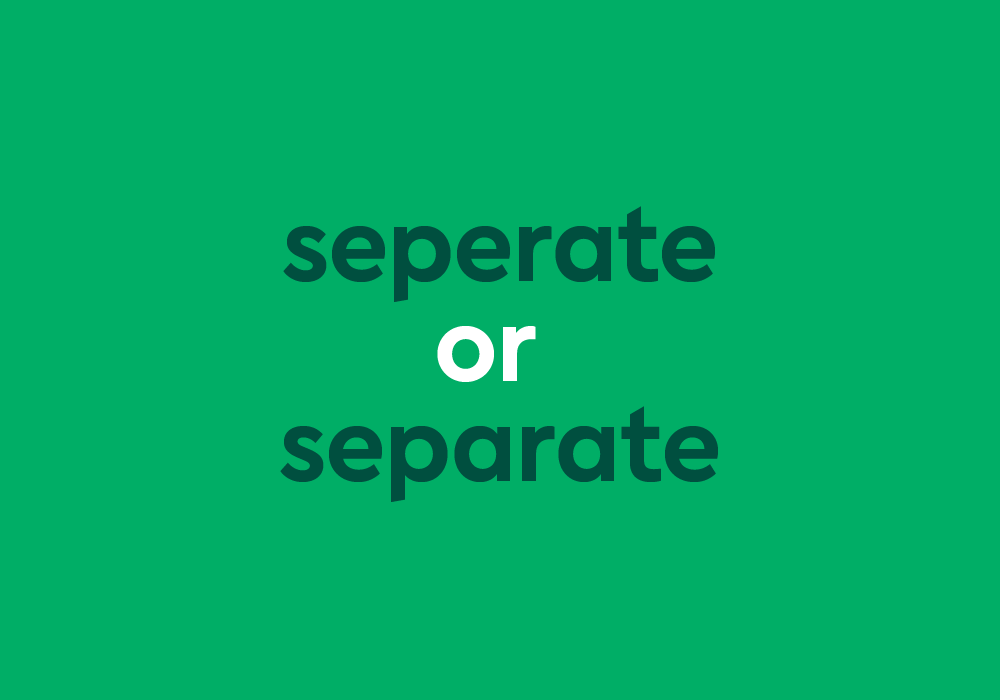The main difference between seperate and separate is that separate is the correct and standard spelling, referring to the division or the act of dividing.
The words seperate and separate are often confused in written and spoken English due to their similar pronunciation and related meanings. However, the word separate is the correct term.
What does seperate mean?
The word seperate is incorrect; separate should be used.
What does the word separate mean?
The word separate can be defined as both a verb and an adjective, with the following meanings:
As a Verb:
-
To divide or set apart: This usage involves the action of creating a distinction or division between things, entities, or individuals, often to keep them apart or organize them differently.
- You can separate laundry into different piles based on colors or types of fabric.
-
To disconnect or detach: This meaning implies breaking the connection or bond between two or more things or entities.
- You can separate two linked objects by cutting the connection.
-
To disperse or scatter: This usage refers to spreading things apart, often evenly.
- You can separate seeds in a garden bed by planting them at equal distances.
As an Adjective:
- Distinct or not connected: When used as an adjective, "separate" describes something that is distinct, individual, or isolated from something else. It implies that there is a clear boundary or distinction between two or more things.
- You might have separate bank accounts for personal and business finances.
- Different or distinct from one another: In this context, "separate" implies that multiple things or entities are distinct from each other, without overlap or connection.
- A company may have separate divisions for different product lines.
In essence, "separate" refers to the act of creating a division or distinction between things or entities, or it describes things that are distinct or not connected to each other. The specific meaning depends on whether it's used as a verb or an adjective in a given context.
More example sentences
- The chef used a knife to carefully separate the skin from the fruit.
- The twin sisters have separate bedrooms, each decorated in their unique style.
- The river served as a natural boundary, separating the two towns.
- In science class, we learned how to separate a mixture of sand and salt using a filter.
- The museum displayed ancient artifacts in a separate exhibit dedicated to history.
- The company decided to separate its marketing and sales departments for better efficiency.
- The judge emphasized the need to keep the evidence for each case separate.
- The restaurant offers a separate menu for vegetarians with a variety of meatless options.
- Our differences should not separate us; instead, they should bring us closer together.
- To maintain privacy, the meeting rooms are equipped with soundproof walls that can be used to separate discussions.
Common idioms/phrases
There are no commonly used idioms in English that directly involve the word separate. However, there are idiomatic expressions and phrases that indirectly convey the idea of separation, but they don't necessarily use the words "separate". Here are a few examples:
- Break up: This idiom means to end a relationship or partnership. For example, "They decided to break up after years of dating."
- Put some distance between: This phrase suggests creating emotional or physical space between oneself and someone or something. For instance, "After their argument, they decided to put some distance between them to cool off."
- Draw a line in the sand: This idiom means to establish a clear boundary or limit. It doesn't use "separate" or "separate" directly but implies a form of separation. For example, "They had to draw a line in the sand to prevent further disagreements."
- Part ways: This expression indicates a mutual decision to go in different directions. For instance, "After working together for many years, they decided to part ways and pursue other opportunities."
To ensure clear and precise communication, it's crucial to choose the correct word in context. Therefore, writers and speakers should be vigilant in their choice of these words, as they play a significant role in maintaining the clarity and accuracy of the English language.
Want to sound like a native speaker?
Engram’s AI-powered grammar checker makes your English sound like a native speaker’s, suggesting natural English expressions on top of fixing grammar, spelling, punctuation, word order, and vocabulary.

Reference














